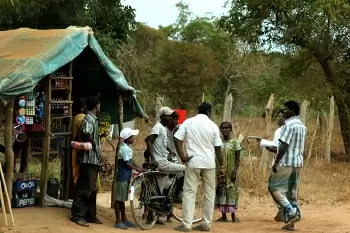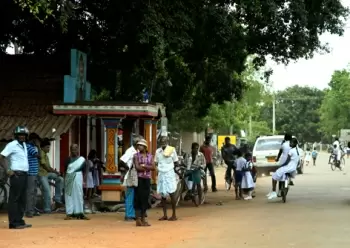TNA’s electoral victory indicates Tamils’ resolve for self-determination

29-July-2011
Vol 2 | Issue 30
The remarkable success of the Tamil National Alliance (TNA), the umbrella organization of Tamil Political parties in the recently held local body elections in the North and East of Sri Lanka is yet another reaffirmation of the Tamils’ belief in their right to self determination.
The TNA won 18 of the 26 local bodies in the region in an election they fought amidst hostile conditions.
The Sri Lankan government and the ruling elite cannot dismiss this mandate as votes gathered under the dictum of the Liberation Tigers of Tamil Eelam (LTTE).
 |
|
Brave voters: Tamils in North Sri Lanka braved threats from pro-Rajapaksa parties to cast their votes in favour of TNA. (Photo above was taken in a Tamil area last week)
|
The political will of the Eelam Tamils has been continually expressed under the shadow of different organizations and various circumstances, but never been under doubt since the historical Vattukotai resolution in 1976.
The President of Jathika Hela Urumaya, Minister Patali Champika Ranawaka, has said the results do not reflect a desire for a federal system, since the ruling party has secured 56 percent of the total vote share in the polls, including the North.
His warning to the TNA against demanding land rights and police powers for the Tamil provinces just because they had won a few local bodies shows where the source of the ethnic conflict is.
The dominant and oppressive mindset of the Sinhalese leadership cannot tolerate even police powers and land rights for the Tamils, leave alone a federal solution.
These are the irreconcilable differences between the minority Tamils and the majority Sinhalese in Sri Lanka that the United Nations and other countries advocating a political solution to the ethnic conflict should recognise.
The Tamils’ journey of resistance - from peaceful agitations in the 1950s to the end of Eelam-IV war in 2009 – has come a full circle. They have returned to where they began: Humiliated, dispossessed, and disempowered beyond recognition in their own land.
Tamils have repeatedly drawn the attention of the international community to their demand for a separate homeland amidst the sufferings they have gone through since the rise of militant Sinhala nationalism in 1956.
 |
|
Silent assertion: Observers feel the vote in favour of TNA reflects the Tamil mindset in favour of an independent Eelam
|
At present, a neo conservative mindset perceives the military conflict in Sri Lanka as one arising due to under development of Tamil areas. Such a view completely ignores the political and ethnic nature of the conflict.
The Sri Lankan government under the leadership of Mahinda Rajapaksa has resigned itself to the idea of military resolution of the ethnic conflict.
The so called development and reconstruction of the North, as in the East, is being characterized by heavy militarization. The Governors of both Northern and Eastern Provinces in Sri Lanka are retired Sinhala Military Generals
Rajapaksa tried to conceal his true face by leading the world to believe that he was waging a war against terror until May 2009 and is now seeking the support of the world for his development programmes in the North.
He has been playing fraud on the global consciousness as revealed by the extent of war crimes and crimes against humanity committed by the Sri Lankan armed forces and his present strategy of military encirclement and the Sinhalisation of Tamil areas in the north and east of Sri Lanka.
While the use and control of land has been at the heart of Sri Lanka’s ethnic crisis, the continuance of ‘counter insurgency’ approach to resolve the Tamil national question and rights of Tamil people should be reexamined by the world governments and international civil society.
The international community has a responsibility to find a peaceful and permanent solution to the ethnic conflict in Sri Lanka.
Professor Ramu Manivannan is Chair-Department of Politics & Public Administration, University of Madras
Also Read: The international community's anger against Sri Lanka may soon be shown in the sports arena
















